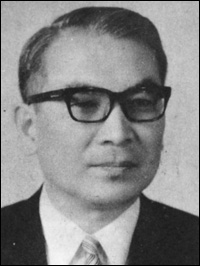‘Accidental death’ of activist may have been murder

Jang Jun-ha, an independence activist, journalist, lawmaker and democracy activist who died in 1975, may have been murdered and not killed after falling while mountain climbing as claimed by the Park Chung-hee administration, according to a new examination of Jang’s remains.
The examination was conducted on Aug. 1 when the bereaved family moved them to a new cemetery, 37 years after he was found dead, the Korean daily Hankyoreh reported Wednesday.
His remains were allegedly buried hurriedly after only a superficial examination. No autopsy was conducted, and there have always been suspicions that he was killed by the Park administration which disapproved of his pro-democracy activity.
“During the new examination, a round-shape hole, six centimeters in diameter, was found behind the right ear. The coroner said the mark doesn’t seem to have been made after someone lost their footing and fell, but made artificially,” Jang’s son, Ho-kwon, was quoted as saying.
“But it is a sensitive issue that could influence politics. We’ll announce details of the examination at the opening ceremony of the memorial park in Paju for my father on Friday,” he said.
The bereaved family said a forensic science professor from Seoul National University took part in the examination.
In August 1975, Jang climbed a mountain in Pocheon, Gyeonggi Province as part of a group of 40 but was found dead. According to the only witness Kim Yong-hwan who helped Jang’s election campaign years ago, he lost his footing on a 14-meter-high cliff and fell to his death, and this was the official cause of death announced by police.
But suspicions lingered because he had no other wounds on the body and it was unlikely the skull at the back of the right ear broke due to the fall. Opposition parties and democracy activists claimed it was a “political murder.”
In 2004, a fact-finding body said the investigation into the death was not properly conducted in 1975 and related records were destroyed. Police officers testified they were excluded from the probe and the Korean Central Intelligence Agency, the predecessor of the National Intelligence Service, took the records. <The Korea Times/Kim Rahn>




